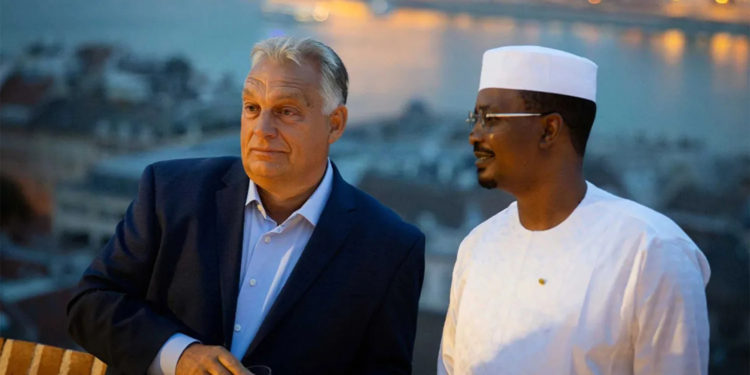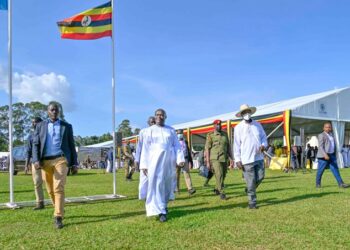Hungary’s leader argues that sending troops to Chad will slow migration, but he seems to be seeking security partnerships in exchange for lucrative minerals.
Hungary is set to deploy about 200 troops to Chad, ostensibly in an effort to fight terrorism and curb illegal migration to Europe. Hungary, a member of the European Union, has suggested sending its contribution of 14 million euros (about $15.6 million) from the European Peace Facility to Chad, a proposal that will be discussed at a meeting of EU ambassadors on Sept. 26.
Last week, Hungarian Prime Minister Viktor Orban hosted Chadian President Mahamat Idriss Déby Itno in Budapest. “Migration from Africa to Europe cannot be stopped without the countries of the #Sahel region,” Orban wrote on social media ahead of the talks.
Security experts contend that 200 soldiers are unlikely to make an impact in a country more than twice the size of France and nearly 14 times larger than Hungary. Orban’s true goal seems to be a slice of the abundant critical minerals pie in Chad. The far-right Orban is following Russian President Vladimir Putin’s playbook of achieving lasting influence with the cheapest of security investments.
In recent months, Budapest has forged closer ties with N’Djamena. It has proposed opening up an embassy, providing $150-200 million to support the food and agriculture sectors, and offering 25 scholarships a year for Chadian students to study at Hungarian universities. Orban’s son, Gaspar Orban, has reportedly been appointed as a “liaison officer” spearheading the mission in Chad. Some analysts fear that Budapest, which is close to the Kremlin, may help further Russian interests in the Sahel.
Chad sits at a central crossroad between North, West, and Central Africa, making it a crucial location for foreign nations competing for African influence. It is France’s last bastion in the Sahel, with more than 1,000 French troops stationed in the country. Chad has also received EU troops as they’ve been kicked out from Burkina Faso, Mali, and Niger. A 10-member team led by Maj. Gen. Kenneth Ekman of the U.S. Africa Command visited N’Djamena last month to negotiate the return of the American troops that were ejected from Chad in April.
But Chadians have never known democracy, and the country remains one of the world’s poorest, with more than 40 percent of its population of 17.7 million living below the poverty line. In a move backed by France, Déby took power in April 2021 following the death of his father, former President Idriss Déby Itno, who died fighting rebels. Déby Itno’s totalitarian 30-year rule was marked by nepotism and corruption.
Any real opponents to the Déby dynasty were barred from running in the country’s most recent ostensibly democratic elections, held in May, which were won by the younger Déby. Pro-democracy protests organized by Chadians in recent years have been violently shut down.
Some analysts believe that Déby has borrowed his late father’s road map of using international military interventions to stay in power. Chad’s military leadership has made itself indispensable in the fight against jihadism while at the same time creating the ingredients for armed groups to prosper.
Sahel states have not sufficiently addressed the root causes of insecurity in their countries beyond foreign military deals. “Just as the war on terror prevented France and the West from correctly ascertaining the root causes of jihadism in the Sahel. … geopolitical rivalry has added another dangerous layer to an already complex crisis,” warned John A. Lechner, Sergey Eledinov, and Adam Sandor last week in Foreign Policy.
Africa has become a geopolitical playground, with varying emerging powers competing for critical minerals, trade, and security opportunities—including Turkey, Qatar, and the United Arab Emirates.
Hungary’s population is just 10 million. As democracy erodes across the continent, the door has been left wide open for even the smallest of foreign powers to strike bargain-basement deals with African autocrats who care less about their publics than about securing power for life.
Yet rampant violence and economic neglect from autocratic regimes help extremist groups recruit jihadi fighters. And security deals alone will not stem the resulting flow of young Africans to Europe. Russia lost experienced fighters in a recent battle in neighboring Mali as armed groups grew stronger. Under these circumstances, the escalating violence will only hasten migration from the Sahel, ultimately creating a bigger headache for Orban and other European leaders.







Discussion about this post